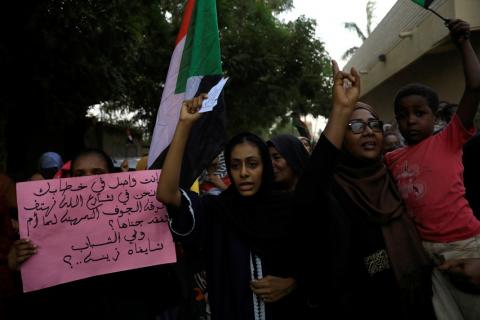Advertisement
Security forces use tear gas to disperse students in Sudan's Khartoum
KHARTOUM (Reuters) - Security forces fired tear gas to disperse dozens of students demonstrating against the ruling military council at a financial academy in the heart of Sudan's capital Khartoum on Thursday, a Reuters witness said.
Dozens of lawyers also gathered outside the main courthouse complex in Omdurman, Khartoum's twin city, calling for civilian rule and for people to join mass demonstrations planned for Sunday. They chanted: "Freedom, peace, and justice. Civilian (rule) is the people's choice."
Demonstrations in Khartoum have become rare since security forces broke up a sit-in outside the Defence Ministry on June 3, leaving more than 100 people dead, according to medical sources.
The sit-in had become the focal point of protests against former president Omar al-Bashir and the military council that ousted him on April 11.
Its dispersal caused the collapse of stalled talks between the military council and a coalition of opposition and protest groups over how to manage a transition towards elections.
Mediators led by Ethiopia's prime minister and the African Union have since been trying to broker a return to direct talks between the two sides.
On Thursday they presented a joint proposal to the two sides, after the military council rejected a previous Ethiopian proposal and called for mediation efforts to be unified. [nL8N23U0TZ]
A draft of the joint proposal seen by Reuters suggested few changes from the previous Ethiopian proposal.
A sovereign council that would oversee the transition, and which had been the sticking point during weeks of talks after Bashir's ousting, would be made up of seven civilians and seven members of the military with one additional seat reserved for an independent member.
However, the make-up of a legislative council would only be decided after the agreement was signed. In previous drafts, the Forces of Freedom and Change (FFC) opposition coalition was to make up two-thirds of the council.
Activists who led months of protests against Bashir have called for a million-strong march on Sunday to try to revive street pressure on the military council and call for it to cede power to civilians.
Bashir ruled Sudan for nearly 30 years before he was unseated following a deepening economic crisis and 16 weeks of street protests.
Sudan's stability is seen as crucial to a volatile region straddling the Middle East and Africa. Various outside powers including wealthy Gulf states are trying to influence its course.
Also on Thursday, the U.N. Security Council approved the extension of the joint African Union-U.N. peacekeeping mission UNAMID in Sudan's Darfur region for four months until Oct. 31, and the extension of the period of its planned drawdown.
Rights groups had appealed against the drawdown and UNAMID's planned withdrawal in 2020, saying it would leave tens of thousands of civilians more vulnerable than before.
According to the United Nations, the military council in Khartoum had demanded that UNAMID hand over its premises to the paramilitary Rapid Support Forces, which rights monitors have accused of widespread abuses in Darfur, as part of the withdrawal.
(Reporting by Khalid Abdelaziz, Writing by Aidan Lewis, Editing by William Maclean)



















Add new comment